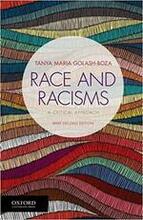Ideal for instructors who want the flexibility to assign additional readings, Race and Racisms: A Critical Approach, Brief Second Edition, is a topical text that engages students in significant questions related to racial dynamics in the United States and around the world. Shorter than Golash-Boza’s highly acclaimed comprehensive text, the Brief Second Edition features a streamlined narrative and is enhanced by its own unique features. New to this Edition: Increased coverage of gender and intersectionality, including a new section on whiteness, class, gender, and sexuality New "Talking about Race" features in the front matter and at the end of each chapter New discussions of biology and ethnicity An expanded section on white privilege Coverage of racial justice social movements such as #OscarsSoWhite Updated "Thinking about Racial Justice" features, which encourage reflection and social involvement
Publications by Year: 2018
2018
BackgroundEpidemiological studies have described an “acculturation paradox.” Increased acculturation to the United States is associated with increased consumption of dietary fat and decreased consumption of fruits/vegetables.ObjectiveTo expand understanding of the dietary acculturation paradox, this study examined how bicultural Mexican-American women construct ethnic identity and how these identities and identity-making processes relate to perceptions of health and nutrition.DesignWe utilized embedded mixed methods (in-depth interviews; survey).Participants/settingWe analyzed a purposive sample of English-speaking Mexican-American women aged 18 to 29 years (n=24) in rural California to assess ethnic identity and diet beliefs.ResultsParticipants described food as central to expressing cultural identity, usually in terms of family interactions. Mexican food traditions were characterized as unhealthy; many preferred American foods, which were seen as healthier. Specifically, Mexican-American women perceived Mexican patterns of food preparation and consumption as unhealthy. In addition, traditional Mexican foods described as unhealthy were once considered special-occasion foods. Among the participants who expressed a desire to eat healthfully, to do so meant to reject Mexican ways of eating.ConclusionsThis study raises questions about the nature of the “dietary acculturation paradox.” While food—the eating of Mexican foods—is central to the maintenance of ethnic identity throughout acculturation, negative perceptions about the healthfulness of Mexican foods introduce tension into Mexican-American women’s self-identification. This study suggests a subtle contradiction that may help to explain the dietary acculturation paradox: While previous research has suggested that as Mexicans acculturate to the United States they adopt unhealthy diets, this study finds evidence that they do so at least in part due to perceptions that American diets are healthier than Mexican diets. Implications for interventions to improve Latinos’ diets include an emphasis on the family and use of Spanish linguistic cues. Finally, messages that simply advocate for “traditional” diets should be reconsidered because that message is discordant with perceptions of the healthfulness of such foods.


